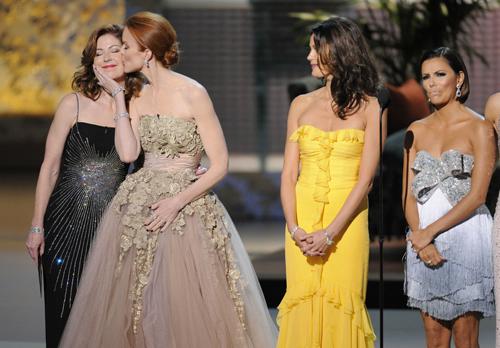Emmy’s reality TV focus upsets audience

Mark J. Terrill, The Associated Press
September 23, 2008
NEW YORK – In reality television’s first bid to attain awards show respectability, it looks like it failed.
Sunday night’s Emmys were a blunt dose of, well, reality for the brand of programming that often dominates its fictional, scripted brethren in the ratings. Its practitioners complain about a lack of respect from Hollywood’s creative community, but did little when they had the chance to earn more.
For its 60th show, the Emmys introduced a new category of best reality show host. The five nominees – Tom Bergeron, Heidi Klum, Howie Mandel, Ryan Seacrest and the eventual winner, Jeff Probst – also hosted the awards.
By unanimous decision, they bombed.
Alluding to the unscripted nature of their shows, the five hosts opened the broadcast with a kind of non-monologue and instead bantered as if having to kill time.
Get The Daily Illini in your inbox!
“We are like on Sarah Palin’s bridge to nowhere, that’s where we are right now,” said Mandel. “The government can’t even bail us out of this. We have nothing.”
The reality hosts were at least self-deprecating, but the schtick – or lack thereof – received an icy reaction from the quiet crowd.
Later, while accepting his award for best supporting actor in a comedy, Jeremy Piven (“Entourage”) said, “What if I just kept talking for 12 minutes? What would happen? Oh wait, that was the opener.”
Backstage, Piven said he wondered during the opening if the audience was “being punked.”
Critics have similarly pilloried the hosts.
The Los Angeles Times called the opening “unforgivably bad” and said, “If we come away with nothing else from this year’s Emmys, let us all agree that having a host with some experience, actually entertaining people, is not a luxury, it’s a necessity.”
Reality television, of course, has long been regarded as a scourge to quality programming; it’s everyone’s favorite dog to kick. There are few critics, or even TV watchers, who proclaim their love for the genre, but, nevertheless, someone -everyone actually- is watching reality TV.
Seacrest’s show, “American Idol,” is easily the most-watched program on television and averages nearly 30 million viewers. Bergeron’s “Dancing with the Stars” pulls in more than 20 million.
The Academy of Television Arts and Sciences has sought to adapt to the new landscape and include the most popular shows in its annual awards, hoping for greater relevance with the general public.
At the same time, though, Emmy voters have gone in the opposite direction. Sunday night’s awards turned out to be a celebration of excellent but low-rated television.
“30 Rock” cleaned up with best comedy, best actress in a comedy (Tina Fey) and best supporting actor in a comedy (Alec Baldwin) despite the relatively low rating of 6.4 million viewers. AMC’s “Mad Men,” which won best drama, doesn’t even draw one million viewers.
Probst said he knew he and his fellow reality hosts had an uphill battle at the Emmys.
“We knew all along it would be tough,” he said. “Having five people agree on anything is tough. Every time we would have one idea, two people would disagree. That’s why we ended up with nothing.”
Reality television has also played a role in labor strife. Despite pressure from the Writers Guild, studios have refused to recognize reality show scribes as writers due to union benefits. And when the writers went on strike last year, the networks replaced many time slots previously occupied by scripted shows with reality programming.
The overall effect is that the continuing rise of reality television means less work for actors and writers. Lingering soreness of this was palpable Sunday night.
Kirk Ellis, who won the writing award for the HBO miniseries “John Adams” was indignant that the reality hosts took up so much time and limelight while several acceptance speeches were cut as short as 15 seconds. (The screen went to a commercial when Ellis, doing some political grandstanding, was cut off in mid sentence.)
“I thought it was interesting that we can have 30 minutes of a show devoted to reality show hosts, but the people who create the work don’t have time to talk,” Ellis said backstage.
If it’s any consolation to him, the audience was less than half of a typical “American Idol” episode. The 12.24 million people who watched the Emmys, according to a preliminary estimate, would be the awards show’s smallest audience ever.
The one irony, of course, is that the Emmys – which gather celebrities in one big room and select who’s a winner – are a bit of a reality show, too.






